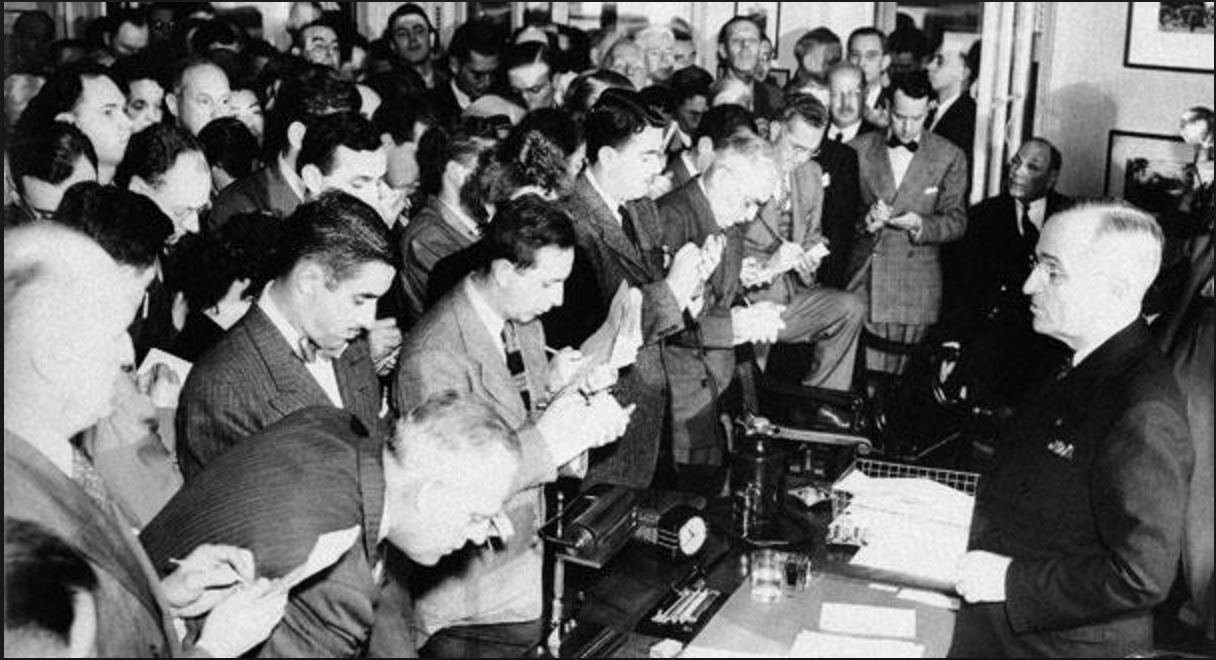Harry S. Truman had a rocky beginning with the press when it miscalled the presidential election of 1948, but once Truman became president the people began to realize that the press was wrong about him all along.
The presidential election of 1948 and the emergence of the press as the “Fourth Estate” of the government occurred simultaneously. The press was now considered to be just as important as the three branches of government. Journalism was gaining respect and Americans saw the rise of influential opinion makers known as pundits, who were accepted among the elite power circles of Washington. Their opinions were highly regarded and the public became dependent upon them.
Following the death of President Franklin Delano Roosevelt, Vice President Harry S. Truman had to make one of the hardest decisions in American history: whether or not the U.S. should drop the atomic bomb on Japan to end World War II. He chose to drop the bomb which, while controversial, resulted in the end of World War II. The presidential election of 1948 followed and the media expected the Democratic underdog Harry S. Truman to lose to the Republican nominee Thomas E. Dewey, who was the clear favorite.
Newspaper publishers generally were not supportive of Truman, however, radio allowed him to speak directly to the people without interference from the newspapers. Truman’s relaxed, charming tone and “off-the-cuff” speeches appealed to his radio listeners. These qualities were particularly effective during his campaign. Truman traveled around the country by train and visited whistle-stops to speak to voters, and these visits allowed Truman to personalize his campaign. The press reporters who traveled alongside Truman were able to see that he was a hard worker who connected with his audiences and touched people by speaking from his heart. Truman showed the voters a side of himself that the nationwide media was unable to see because most of his whistle-stop speeches were not broadcasted nationally. Americans appreciated Truman’s sincere interactions and remembered them when they went out to vote. Although the publishers of prime newspapers disliked Truman because he criticized big businesses like their own, the press and the people with whom Truman visited saw Truman for who he really was, which ultimately won him their support in the election of 1948.
In the months leading up to the election, Dewey was so far ahead of Truman that the polling companies stopped counting votes in October, even though there was a month before voting even began. No one believed Truman, a Democrat from Missouri, could catch up to Dewey, but this was a huge misconception. Once November arrived and the votes were tallied, Truman won by a staggering margin of 303 electoral votes to Dewey’s 189. The outcome of the election shocked America, and Truman was voted to be the 33rd President of the United States. This turn of events was in part because Truman was able to convince most of the south, including Texas, to vote democrat (the only other time that this has happened post World War II was with Lyndon B. Johnson in 1964 and Jimmy Carter in 1976). Despite various attitudes regarding Truman’s decision to drop the atomic bomb, his interactions with voters during his campaign inspired Americans to trust him.
The media portrayed Truman in a negative light. During Truman’s presidential term he favored a liberal agenda, which drew opposition from both the conservative dominated Congress and the news media. Congress was opposed to Truman’s support of U.S.’ internationalist stance in world affairs as well as the Fair Deal, Truman’s set of proposals that guaranteed all Americans access to insured health care, increased minimum wage and equal rights. Similarly, major newspaper publishers like William Randolph Hearst, McCormick-Patterson, Scripps-Howard and Time-Life were not in favor of Truman nor his policies. After making false predictions about the election, the press was already off to a bad start with Truman. In fact, the Chicago Daily Tribune published the election day paper with the headline “Dewey Defeats Truman” even before the results were final. From there, the press continued to bash his positions on the dropping of the atomic bomb and the U.S. involvement in the Korean War and the Cold War.
Despite the media’s false assumptions about Truman’s inability to be a good president, he had some remarkable accomplishments during his time in office; such as his instrumental role in the creation of the North Atlantic Treaty Organization (NATO) and the United Nations (UN), his attempts to stop the spread of communism through the creation of the Truman Doctrine and his involvement in the Marshall Plan. Truman was determined to prove to the nation that he was fit to be president, and over time, the public and the media came to recognize Truman as a great president even after the “greatest miscalled presidential election in journalistic history.”




































